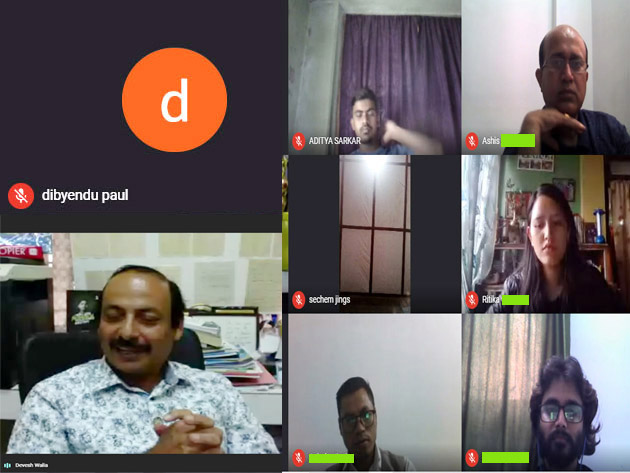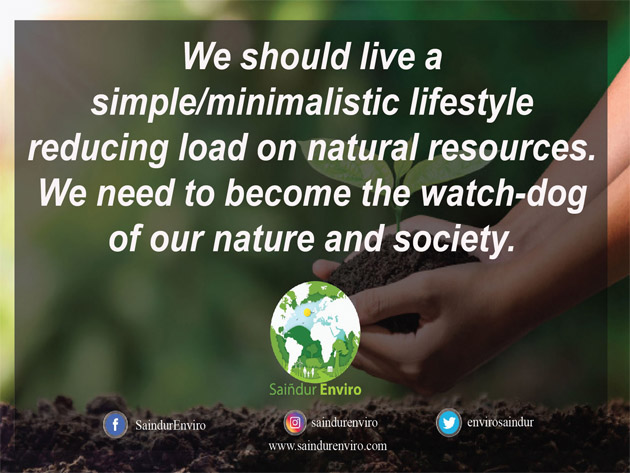
World Environment Day celebrated around the globe every year on 5th June re-awakens and reminds us about our duties towards nature, just like a mother awakens her child in the morning everyday reminding that it’s time, you have to get ready to go to school.
A one day webinar on ‘Time for Nature’ organized by Saindur Enviro in collaboration with Rotary Club of Orchid City (Shillong) and Rotaract Club of NEHU (Shillong) on 5th June to mark International World Environment Day 2020 concluded with a message that we should be kind and respectful to nature which is our sole supplier and reason responsible for our existence. A total of 78 participants including students, environmental professionals, social workers, representatives from environmental NGOs, registered for the webinar from Meghalaya and other states of the country.
Nature, the sole supplier of everything is under threat. It's high time that we realize and play a pivotal role in protecting nature.
The webinar started with a welcome note by Mr. Vivek Kumar, Co-founder and Director, Saindur Enviro and followed by introduction of eminent speakers. Among the eminent speakers were Prof.(Dr.) D. Paul, Head, Dept. of Environment Studies, NEHU, Shri W R Kharkhrang, MSPCB, Govt. of Meghalaya and Prof.(Dr.) D. Walia, Dept. of Environmental Studies, NEHU, Shillong.
Prof. D. Paul delivered a talk on “Celebrating Biodiversity: Time for Nature”. He said that, nature which is source of all supplies and reason responsible for existence of life on planet earth is under serious threat due to various anthropogenic activities. He added that the current society which is mostly driven by economic model promoting consumerism is not sustainable in long run since it is too much dependent on natural resources which lead to over-exploitation and a number of environmental problems. He suggested that we should switch to simple/minimalistic lifestyle which will help in reducing the load on natural resources. His talk was followed by a good round of interaction. The participants came up with questions and suggestions on various on-going environmental problems. One of the participants, Borsha Dutta asked Prof. D Paul to express his opinion on decision of Indian Govt. to start coal mining in Dehing Patkai (located in Assam) which is home to a number of Elephants and very rich in floral and faunal diversity. Prof. Paul replied that due to increasing population, the demand on natural resources is increasing for various developmental activities, our country has a very strong legislation at place for protection of environment but still lacks in proper implementation. He added that government should re-think on the decision of starting Coal mining in Dehing Patkai and suggested that Dehing Patkai should be left alone. Another participant asked if loss of biodiversity and climate change is related to COVID-19 pandemic. Prof. Paul replied that the novel coronavirus has jumped from animal to human population, but there is no concrete research/reports suggesting a direct relationship between biodiversity loss and climate change with COVID-19 pandemic. He added that studies are in progress in different research institutions throughout the world on the topic to explore the possibility of a relation between biodiversity, climate change and COVID-19 pandemic.

Shri W R Kharkhrang couldn't join with the participants due to some unforeseen circumstances. But, he sent his best wishes to all the participants.
Prof. D. Walia spoke on how over-exploitation of natural resources and pollution due to various anthropogenic activities are deteriorating the health of nature. He said that we really need to stop over-exploitation of natural resources which is leading to natural degradation and environmental pollution. He also stressed on simple/minimalistic lifestyle which will reduce the load on natural resources. He said that each and every individual should play an active role in protecting nature. He reminded everyone of Gandhi’s saying, “Earth provides enough to satisfy every man's needs, but not every man's greed”.

Aditya Sarkar, one of the participants asked a question on who is responsible for vizag gas leak which lead to loss of lives and destruction to environment, he also added that it appears we have not learnt any lesson from Bhopal Gas Tragedy. Prof. Walia replied that the incident took place because of negligence in following environment and safety protocols. He said that govt. should take necessary steps to make sure that such negligence does not happen in future and govt. in collaboration with such manufacturing companies using toxic chemicals should conduct awareness campaigns as a part of their corporate social responsibility (CSR) to aware the nearby residents/villages on what is to be done during such accidents and how people can save their lives. Another participant asked a question on single-use plastic pollution.
Prof. Walia mentioned that we need to raise our voice for environmental protection.
The webinar concluded with a vote of thanks and a message that we should live a simple/minimalistic lifestyle reducing load on natural resources and we need to become the watch-dog of our nature and society.